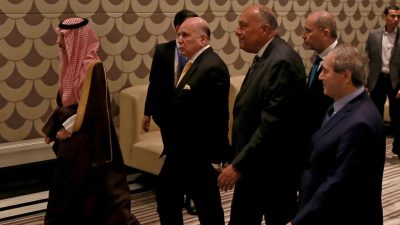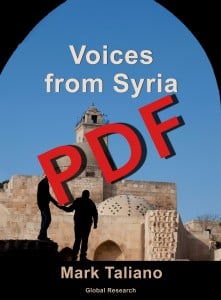Syria Takes Steady Steps on the Diplomatic Stage

All Global Research articles can be read in 51 languages by activating the Translate Website button below the author’s name.
To receive Global Research’s Daily Newsletter (selected articles), click here.
Click the share button above to email/forward this article to your friends and colleagues. Follow us on Instagram and Twitter and subscribe to our Telegram Channel. Feel free to repost and share widely Global Research articles.
***
Jordan played host to the newest regional meeting on the road to the reinstatement of Syria as a member of the Arab world. Jordan’s Foreign Minister Ayman Safadi met privately with Syria’s Foreign Minister Faisal Mekdad in Amman on May 1, before the larger group meeting which included foreign ministers of Syria, Jordan, Egypt, Iraq, and Saudi Arabia.
Jordan has put forth an initiative to reach a political solution to the Syrian crisis which began in 2011, and was a US-NATO attack on Syria for regime change. The plan failed but was supported by many Arab countries that are US allies.
Almost all of the members of the Arab League have decided to reinstate Syria to its position at the round table which is set to meet May 19 in Riyadh; however, Qatar and Kuwait are hold-outs. Syria was suspended in 2011 following the conflict erupting. Two weeks ago, a meeting was held in Jeddah but failed to reach a consensus on whether Syria will be at the upcoming Arab League meeting.
The US is against any rapprochement with Damascus, and Qatar and Kuwait may be signaling their continued willingness to follow US directives from the State Department.
The meeting covered refugees, water issues, and border security, including the fight against smuggling the highly-addictive amphetamine Captagon. Jordan is both a market for and a main transit route to the oil-rich Gulf countries for Captagon.
Progression toward reconciliation
Syrian President Bashar al-Assad has participated in a flurry of visits in recent months on the road to resuming his legitimate position in the Middle East after 12 years of isolation dictated by Washington.
Both the United Arab Emirates (UAE) and Saudi Arabia have led the way in repairing the broken relationship between Syria and the world. President Assad and his wife visited the UAE, and last month Saudi Foreign Minister Prince Faisal bin Farhan Al Saud visited Assad in Damascus.
An outpouring of humanitarian aid was sent to Syria following the devastating February 6 earthquake which killed about 50, 000, including about 6,000 in Syria. On March 10, China brokered a reconciliation between Saudi Arabia and Iran. That was a political ‘earthquake’ felt throughout the Middle East, and further paved the road to reconciliation with Damascus.
Syria is hoping the wealthy Gulf monarchies will assist Syria in its reconstruction after 12 years of conflict.
Turkey killed ISIS
Turkey’s President Recep Tayyip Erdogan revealed that the Turkish intelligence agency, MIT, killed ISIS Chief Abu Hasan Al-Hashimi Al-Qurashi in Idlib province on Saturday. Turkey illegally occupies territory in northern Syria following a series of invasions to drive Kurdish groups away from the Turkish-Syrian border.
Abu Hussein Al-Qurayshi was named the chief of ISIS in October 2022 after its previous chief was killed.
This marks three ISIS chiefs all killed in Idlib province in Syria. Beginning with the 2019 killing of Abu Bakr al-Baghdadi, who was killed in a US military operation ordered by President Trump.
Next came his successor, Abu Ibrahim al-Hashimi al-Qurayshi, who was killed in a similar raid in February 2022.
This latest killing was in Jindires, in Idlib province, which is under the control of Turkish-backed terrorist groups following Radical Islam. Erdogan is a follower of the Muslim Brotherhood and his AKP party is also Muslim Brotherhood-affiliated.
The Syrian Democratic Forces, SDF, is a US-backed Kurdish paramilitary in northeast Syria, and Erdogan has invaded Syria intending to dismantle the SDF and their communist partner the YPG, which is linked to the outlawed terrorist group, the PKK, which has killed 30,000 people over three decades.
ISIS came to the world stage in 2014 when its leader Baghdadi declared an Islamic State in Iraq and Syria. In a combined victory, but fought separately by the Syrian Arab Army, Russian Army, Iranian forces, the SDF, YPG, and the US military, ISIS was defeated in March 2019 in their last remaining stronghold in Syria, on the Iraq border.
Who controls Idlib?
Abu Mohammad al-Julani is a Syrian who fought in Iraq with Al Qaeda, then became an associate of the first leader of ISIS, Baghdadi, then went to Syria and formed Jibhat al-Nusra, but when the US decided to outlaw al-Nusra, he re-branded himself as Hayat Tahrir al-Sham so he could continue to be supported by the White House and Congress.
Julani is the man who receives all humanitarian aid in Idlib and distributes it to those he chooses while denying aid to his enemies, and the leftovers he sells to the civilians in Idlib out of his new multi-storied shopping Mall, Al Hamra.
Julani took off his terrorist uniform and headscarf, put on a tailored suit and tie, and gave an interview to the US media outlet NPR. He was in the process of re-branding himself from head-chopping radical, to a modern statesman capable of working with the US government, his partner.
In 2020, the US Department of State’s Rewards for Justice program announced a reward of up to $10 million for information leading to the identification or location of al-Julani. He is not hiding, every UN aid truck which comes into Idlib from Turkey is met by him.
Julani made some Western humanitarian groups upset when he and his terrorists stormed into their warehouses and seized valuable aid, and when he dictated that no charity program should be focused on women or women’s rights. His administration of Idlib, which he calls the Salvation Government rules by strict Islamic law. The punishment for theft is to have the accused’s hand chopped off.
Julani sees himself in a new position in the future Syrian government in Damascus. This might be the concession that Biden and Blinken demand to allow Assad to be recognized and the sanctions lifted. Julani has committed so many war crimes it would be a very hard sell for the Syrian people to accept him, and even harder among the 3 million human hostages, he rules in Idlib.
Turkish election May 14
Turkish voters will head to the polls on May 14, and the second round is scheduled for May 28. The incumbent president, Recep Tayyip Erdoğan, and opposition leader Kemal Kılıçdaroğlu are battling for the support of the Turkish citizens who are living under hyper-inflation, devalued currency, and the aftermath of an earthquake deemed the ‘disaster of the century’.
Erdogan has publically stated his intent to repair relations with Assad, but Damascus prefers to wait out the election first, and then deal with the winner.
Regardless of who wins, Damascus and Moscow are demanding Ankara withdraw its occupation forces from Idlib, Afrin, Jarabulus, and the area between Tell Abyad and Ras al-Ain.
Both candidates promise if they win they will return all Syrian refugees to their homeland. Turkish citizens see the almost 4 million Syrian refugees in their midst as a source of instability and a financial drain. Lebanon is already deporting Syrian home forcibly, and many European countries will be waiting for the right time to institute their repatriation plans.
Israel attacked Aleppo
The international airport in Aleppo has been a main channel of humanitarian aid to the earthquake-hit areas of northwest Syria. Israel bombed the airport and stopped all aid deliveries.
One Syrian soldier was killed by Israel, with five other soldiers injured, along with two civilians.
In March, Israel struck Aleppo’s airport on two different occasions and put it out of commission for several days.
Israel has carried out hundreds of attacks on Syria in recent years, and on Saturday Israeli air raids over Homs wounded three civilians, and a civilian gasoline station was burned up.
Syria had been energy efficient before the US-NATO attack in 2011, but now the US occupation forces control the main oil fields, which prevents Syria from refining their petroleum into gasoline, which has caused a chronic gasoline shortage, with long lines sometimes for days to fill up a car.
*
Note to readers: Please click the share button above. Follow us on Instagram and Twitter and subscribe to our Telegram Channel. Feel free to repost and share widely Global Research articles.
This article was originally published on Mideast Discourse.
Steven Sahiounie is a two-time award-winning journalist. He is a regular contributor to Global Research.
Featured image is from MD
Order Mark Taliano’s Book “Voices from Syria” directly from Global Research.
**Voices from Syria**
Author: Mark Taliano
ISBN Number: 978-0-9737147-9-1
Year: 2017
Product Type: PDF File
List Price: $6.50


